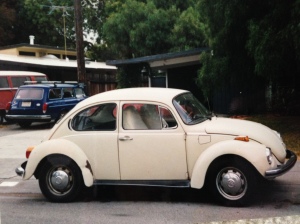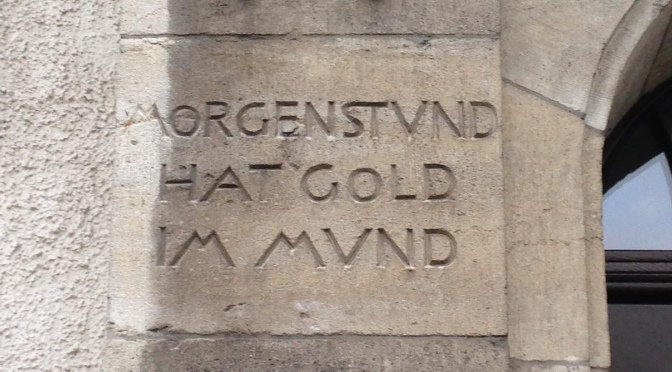The past two weeks have been a . . . what? I’m tempted to lapse into cliches–“roller coaster,” “whirlwind,” or maybe “sh**storm” (as one friend from church described it).
My 12-year-old son had acute appendicitis, from which he now seems to be recovering nicely, thank goodness. And, while he was in the hospital, my German father-in-law passed away. While this was not unexpected, as he was almost 86 years old and his health had been declining, the timing was difficult. Thanks to my parents’ generosity in watching our kids, including our convalescent son, for a week, I was able to go to Germany with my husband, attend the memorial service, and help clean out old possessions. We’re back now. The 6-hour time difference between Germany and Boston has not yet fully worn off, leading me to wake up before the sun.
 My husband grew up in a small midwestern town called Mülheim an der Ruhr, in the “Ruhrgebiet” near Düsseldorf. “Midwestern” actually connotes some qualities in Germany that are similar to those it brings to mind in the US: modest, hardworking, family-oriented, industrial, not given to religious or political extremism, and possessing of an accent that is easy to understand. I learned Hochdeutsch (“high German,” a standardized dialect used in education and commerce) at university, and it stands me in good stead in the Ruhrgebiet, unlike, say, in Bavaria.
My husband grew up in a small midwestern town called Mülheim an der Ruhr, in the “Ruhrgebiet” near Düsseldorf. “Midwestern” actually connotes some qualities in Germany that are similar to those it brings to mind in the US: modest, hardworking, family-oriented, industrial, not given to religious or political extremism, and possessing of an accent that is easy to understand. I learned Hochdeutsch (“high German,” a standardized dialect used in education and commerce) at university, and it stands me in good stead in the Ruhrgebiet, unlike, say, in Bavaria.
We decided early on in our life together, after a rather harrowing overnight flight on our honeymoon (which we still refer to as being MÜDE IN MÜLHEIM), that our later trips back to visit his family and friends would go through London, would include an overnight stay there in an airport or other hotel after a day flight, and would continue on to Germany late the next morning. “But you waste a whole day that way!” some folks have protested. Perhaps, but our experience is that the day is wasted anyway after an overnight flight, and includes a wholly unpleasant (and in my case unsuccessful) struggle to stay awake that precludes doing virtually anything else.
After arriving in Mülheim with our rental car, we went to his stepmother’s house to see what was left. She had already taken care of many things, including the Memorial Service arrangements for the following day. But there were boxes–many boxes–up in the attic, in the basement, and in a room that my father-in-law had used as a study after retiring from his job as an English and French teacher in the Gymnasium my husband attended. In truth, the thought of all this “stuff” made me a little anxious: my father-in-law’s difficult life circumstances had taken their psychological toll and had made him want to hold on tight to things. Taken prisoner in Pomerania by the Russian army when he was only 15 and sent to a Siberian labor camp, he had lost everything in World War II. After the war, he had come to Mülheim with “nothing but a blanket and two left shoes,” and found happiness with his teaching career and his wife and son, until his wife–my husband’s mother–passed away in 1989, before we ever met. He had since remarried, to a lovely and loyal woman, my stepmother-in-law, and it was she we came to see now. She herself wasn’t sure what was in all those boxes.
 As we talked, she pointed out a clock on the windowsill. We have a similar one at home, it is called an “Anniversary Clock.” This clock was a gift from him early in their marriage. It had stopped some time ago and nothing she could do–new batteries included–would start it up again. But the morning he passed, it had somehow mysteriously started again, and was still going. This clock now reminded us how late it was–already after 6 pm–time passed very quickly there up until the end of our visit, largely but not only because of the time difference.
As we talked, she pointed out a clock on the windowsill. We have a similar one at home, it is called an “Anniversary Clock.” This clock was a gift from him early in their marriage. It had stopped some time ago and nothing she could do–new batteries included–would start it up again. But the morning he passed, it had somehow mysteriously started again, and was still going. This clock now reminded us how late it was–already after 6 pm–time passed very quickly there up until the end of our visit, largely but not only because of the time difference.
We started going through some old folders and albums. Some of the folders were easy to dispatch: receipts from the 1970s and 1980s for furniture, appliances, and books; bank and insurance statements. These were no longer necessary to keep–the appliances themselves, and even the furniture, were long gone–but there were a lot of these papers, and they were pretty dusty and musty. We were looking for “treasures:” personal correspondence, photos, bank account and insurance verification that would make our task of closing out accounts easier. There weren’t many of these treasures to be had at the moment, so we took a break and went for a walk to look for some geocaches there in Mülheim around my stepmother-in-law’s house.
 This search led us to an old school building down the street, which had some interesting carvings: “Morgenstund hat Gold im Mund,” reads one. I had to ask my husband what that meant. According to him, it’s a popular folk saying in support of being an early riser, kind of like “Early to bed and early to rise makes a man healthy, wealthy, and wise” is in the US. “The morning hour has gold in its mouth.” I’m reminded of the sunrise itself, the early morning when the golden sun makes its appearance. I can’t speak to the relevance of the turtle or the butterfly, but they’re sweet.
This search led us to an old school building down the street, which had some interesting carvings: “Morgenstund hat Gold im Mund,” reads one. I had to ask my husband what that meant. According to him, it’s a popular folk saying in support of being an early riser, kind of like “Early to bed and early to rise makes a man healthy, wealthy, and wise” is in the US. “The morning hour has gold in its mouth.” I’m reminded of the sunrise itself, the early morning when the golden sun makes its appearance. I can’t speak to the relevance of the turtle or the butterfly, but they’re sweet.
The second geocache we went looking for was on the ground of Kloster Saarn, a Cloister museum in Mülheim. The weather was cool and cloudy, and the grounds were a nice place for a walk. Nonetheless, these grounds were completely deserted on a Monday evening. This helped us avoid detection around the area of the cache, which was magnetic and located on a downspout on one of the buildings. The trees were managed creatively and cut into the shape of crosses:

There was also what looked on first glance like a large, green field. But on closer examination, this field was revealed to be a pond, complete with ducks swimming in it.

My husband mentioned that, despite having grown up in Mülheim, he had never been here before. His stepmother lives in a different part of town from where he grew up. We planned to visit his childhood home in the coming days too. It was sold a couple of years ago and a new young family is now living in it.
The greenery, the museum, the ducks, the clock, the river, the advice from some 20th century architect-sage. These all helped us feel part of the circle of life as we prepared mentally for the Memorial Service tomorrow.
51.418568
6.884523




























